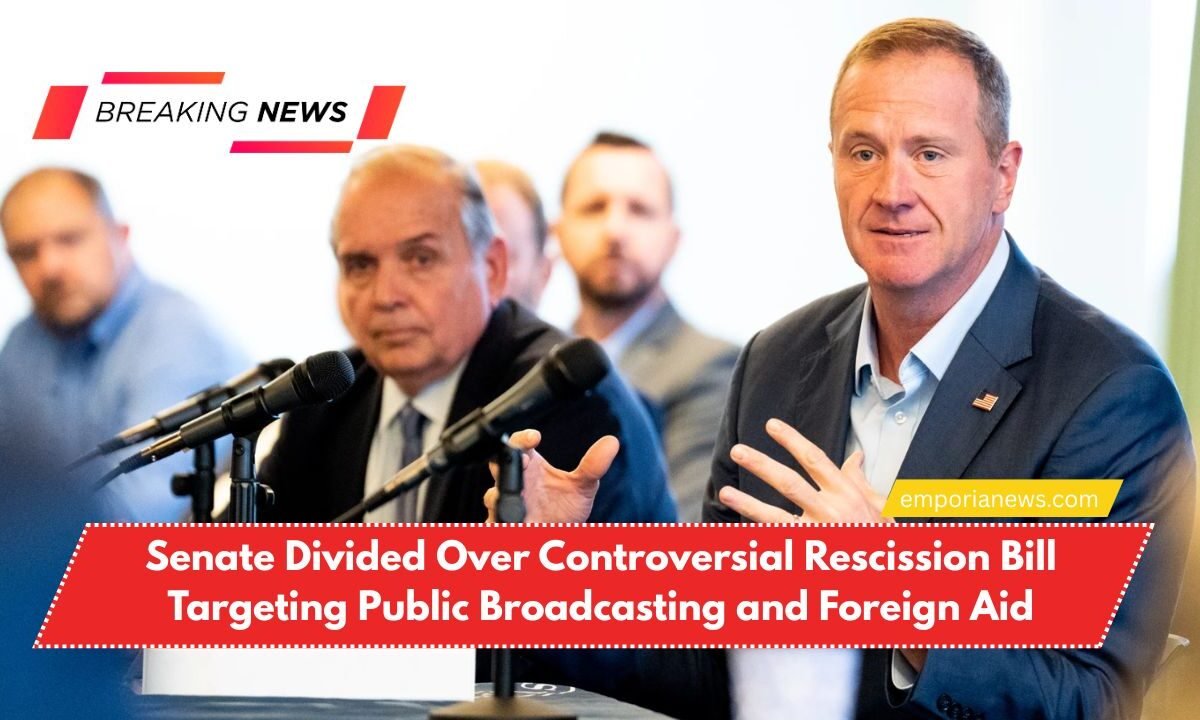A heated debate has emerged in the U.S. Senate over a controversial rescission package that would roll back previously approved federal funding.
This legislation, strongly backed by former President Donald Trump, is at the center of a partisan battle between Missouri and Illinois senators and could have major implications for both domestic media funding and international diplomacy.
Understanding the Rescission Package
The proposed rescission bill seeks to reverse funding authorizations that Congress had already approved. It aims to slash over $1 billion in support for the Corporation for Public Broadcasting (CPB), which channels money to media outlets like PBS and NPR affiliates, including Nine PBS and St. Louis Public Radio.
In addition to targeting public media, the bill proposes multi-billion-dollar cuts to U.S. foreign aid programs.
The measure is being spearheaded by Missouri Senator Eric Schmitt, who is managing the bill on the Senate floor. He emphasized that this legislation aligns with the fiscal priorities of voters who re-elected Donald Trump in the last election.
“This bill represents a critical first step in restoring fiscal responsibility,” Schmitt declared. “It’s about prioritizing American sovereignty and reclaiming control over our national destiny.”
Missouri Republicans Support the Cuts, Illinois Democrats Push Back
Senators Josh Hawley and Eric Schmitt of Missouri, both Republicans, voted in favor of advancing the bill. Meanwhile, Democratic Senators Tammy Duckworth and Dick Durbin of Illinois opposed even beginning debate on the legislation.
Senator Schmitt, in his floor remarks, harshly criticized NPR and PBS, labeling them as “American Pravda,” a reference to the propaganda publication of the former Soviet Union.
He cited statements by NPR CEO Katherine Maher and former editor Uri Berliner as evidence of left-wing bias in public media.
“These are not neutral journalistic institutions,” Schmitt said. “They function as taxpayer-funded mouthpieces for progressive activism under the guise of journalism.”
Democrats Raise Alarm Over Rural Impact and Global Consequences
Senator Dick Durbin voiced strong concerns about the bill’s potential harm, particularly for rural communities that rely heavily on public broadcasting.
He warned that stripping CPB funds could jeopardize essential services for areas with limited media access.
Durbin also pushed back against the foreign aid cuts, arguing that they damage the United States’ global reputation and hinder national security.
“This isn’t just about money—it’s about who we are as a country,” Durbin stated. “Foreign aid is an effective tool that often prevents the need for military intervention. Cutting it sends the wrong message to the world.”
Durbin: It’s a Loyalty Test, Not Fiscal Responsibility
Durbin argued that the bill is less about fiscal prudence and more about demanding loyalty to Trump. He warned that Republican senators face political consequences if they oppose the package.
“Let’s be clear—this isn’t about cutting waste,” Durbin said. “It’s about demonstrating fealty to Trump. The former president is using this vote as a litmus test for party loyalty.”
Duckworth Doubts GOP Will Break Ranks
Before the Senate vote, Senator Tammy Duckworth expressed skepticism that Democrats could persuade enough Republicans to oppose the bill.
She highlighted a pattern where some GOP members initially resist but ultimately fall in line with party leadership.
“They always find a way to make a deal,” Duckworth lamented. “In the end, someone caves, and the vote goes through with Vice President JD Vance breaking the tie.”
Tight Senate Vote Shows Fractures in GOP
On Tuesday, three Republican senators—Lisa Murkowski (Alaska), Susan Collins (Maine), and Mitch McConnell (Kentucky)—joined Democrats in a procedural vote to delay the bill.
However, Vice President JD Vance cast the tie-breaking vote, allowing the measure to move forward with a 51-50 split.
The bill is expected to be revised by Republicans before returning to the House of Representatives. Because of its special classification, rescission legislation only requires a simple majority to pass—unlike most bills that require a 60-vote threshold in the Senate.
The rescission bill is shaping up to be one of the most politically charged legislative efforts of the year.
With billions in funding for public broadcasting and foreign aid at stake, senators are not only debating the financial merits of the proposal but also the deeper ideological and political motivations behind it.
As the bill moves back to the House and eventually to Donald Trump’s desk, the outcome may reflect not just a budgetary decision, but the state of political alignment and influence in today’s GOP-controlled Senate.




